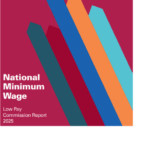
MPs debate the impact of NICs changes on employers
NDNA briefed MPs ahead of the Second Reading of the National Insurance Contributions (Secondary Class 1 Contributions) Bill 2024-25 which was debated this week.
The brief detailed the impact of NICs changes on the Early Education and Childcare Sector, highlighting issues such as an average nursery will face additional staffing costs of around £40,000 per annum as a result of increased salaries and NIC increases.
The briefing also raised the fact that private nurseries delivering government funded hours will not be entitled to the Employment Allowance if more than 50% of the work they do is publicly funded. NDNA also stressed the fact that staffing costs make up 75% of a nursery’s running costs, compared with 30% for the average restaurant.
Purnima Tanuku OBE, Chief Executive of National Day Nurseries Association (NDNA) said: “Ahead of the Parliamentary debate yesterday we briefed all MPs on the challenges that early years providers will face regarding increased employer National Insurance Contributions. We appreciate all the MPs who raised this issue in Parliament, that nurseries should be considered as an exception because they support children’s early development and enable parents to work.
“Early years providers will be badly impacted because staffing costs make up 75% of their overall expenditure. Our calculations show that nurseries on average will have to find an additional 11% on top of their usual staffing bills from April 2025.
“If this additional amount is not included in the funding rates due to be announced this month, then nurseries will have no choice but to pass this extra burden onto parents in the form of fees, reduce the number of places they offer or go out of business. With the final phase of the childcare expansion only a few months away, it’s vital that the Government supports nurseries to be able to meet this increased demand.
“But the Government must recognise that by increasing the number of hours of funded childcare available to parents, they will disadvantage nurseries in England: they won’t be eligible to apply for the employer allowance because more than half of their income will be public funding.”
During the debate Labour MP Stella Creasy (Walthamstow) said: “85% of places are in private and co-operative nurseries, will he look at extending the employment allowance that he’s giving to state nurseries to private and co-operative nurseries as well, so we can support childcare expansion?”
James Murray (Exchequer Secretary to the Treasury) replied: “The eligibility for the employment allowance is not changing.”
Highlighting that changes to NICs went beyond health and care, Daisy Cooper (St Albans) said:
“They will also affect early years providers and education providers, at a time when we should be reducing the costs of childcare and care services and supporting parents back into work. The measure will undermine that.”
Commenting during the debate former education secretary Damien Hinds (East Hampshire) said:
“Let us take nurseries as an example. We have had another mission this week on early years education, which I welcome, but it will be hampered in its delivery by this national insurance contributions rise.”
In addition, two Scottish MPs Dave Doogan (SNP, Angus and Perthshire Glens) and Graham Leadbitter (SNP, Moray West, Nairn and Strathspey) brought up the issue of increasing staff pay to childcare setting employees.
Also attending the debate was Liz Jarvis (Eastleigh) who stressed the impact on small businesses stating:
“I have also been contacted by many owners of small businesses who are hugely concerned about the impact that changes to employer national insurance contributions will have on their businesses. That includes the early years sector, which plays a crucial role in supporting working families and the wider economy. Providers who operate on tight margins and with a limited ability to adjust income face unique challenges. For a sector that is already under immense financial pressure, this added burden feels short-sighted and risks undermining the stability of a service that families rely on so heavily.”
Responding to Liz Jarvis and bringing closure to the debate, Treasury minister Tulip Siddiq said:
“The Government inherited the worst economic circumstances since the second world war, and our first step must be to fix the foundations of our economy.
“In spite of the challenges, the Chancellor announced in her Budget significant increases to the funding that early years providers are paid to deliver Government-funded childcare places, meaning that the total funding will rise to over £8 billion in 2025-26.
“This Government’s mission is economic stability, restoring our public services, a thriving workplace, making sure that we have a strong education system and strong public services, putting more money in working people’s pockets, and fixing the foundations of our economy.”
- England
Similar Articles
Government research shows school-based nurseries are not delivering flexible provision to its communities

One in seven childcare professionals paid around minimum wages


